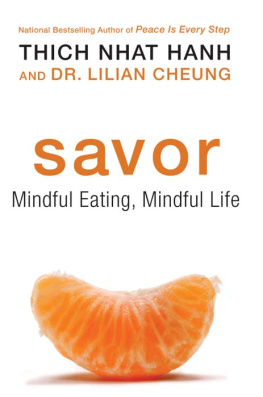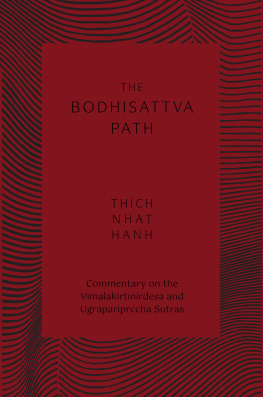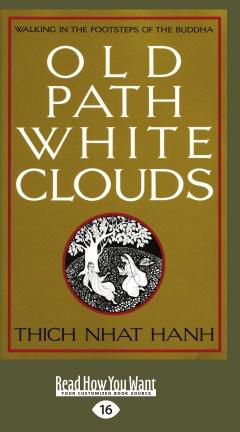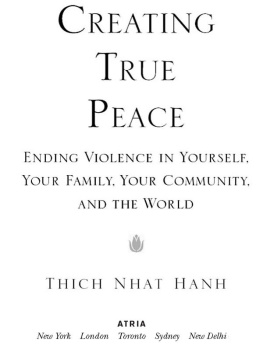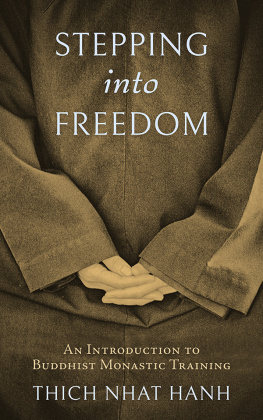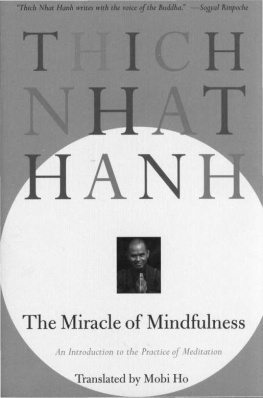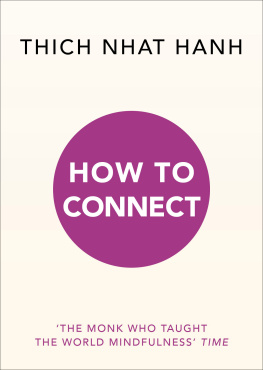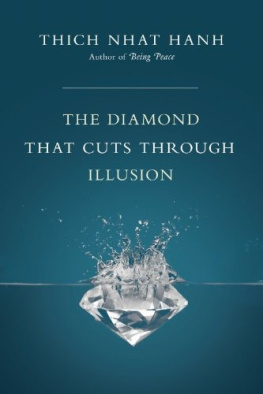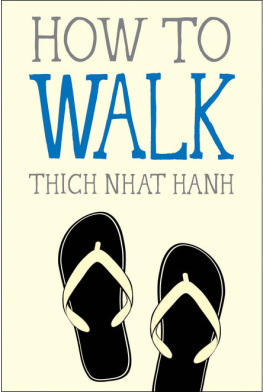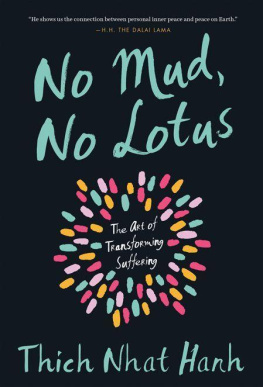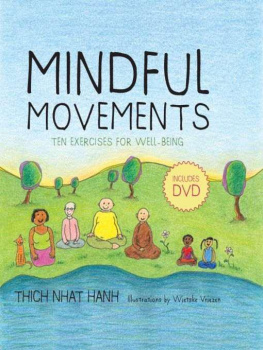SAVOR
Mindful Eating, Mindful Life
Thich Nhat Hanh
and
Lilian Cheung D.Sc., R.D.

CONTENTS
Most books about nutrition and diet stress the calorie content of foods, saturated fats, trans fats, carbohydrates, portion size, and the balance between energy intake and energy expended. This book is different. This book is not only about what to eat. This book also teaches how to eat. If you are someone who is concerned about your weight, perhaps you have tried dieting in the past. Maybe you have gone from cutting calories, to excluding fats, to avoiding carbs, to taking a chance on the grapefruit diet or some other fad. Perhaps you have even lost weightonly to gain it right back within a few months. You know something is wrong and you feel not in control of your own body. You are convinced that something has to change, but where do you begin? The answer, provided in this book, is not to begin with what you put on your plate. Rather, you begin with what is already inside you, with your awareness and experience of every moment you livewhat the authors call mindfulness. While the concept of mindfulness derives from Buddhist teaching, anyone can become more mindful in nourishing our bodies. Many distractions in daily life reinforce the mindless ingestion of food, and mindless eating is a strong driver of weight gain and obesity. With awareness and practice, it is possible to become more mindful in our eatingand in our lives. This book tells you how to do it. Authored by an eminent spiritual leader and a renowned nutritionist, this work infuses science into wisdom and wisdom into science. It is a practical guide to eating mindfully and points the way to attain a healthier weight and a more satisfying life. Harvey V. Fineberg, M.D., Ph.D.
President
Institute of Medicine
The National Academies
Washington, D.C.
IF YOU HAVE PICKED up Savor because you want more peace and happiness in everyday life, then you are in the right place. If you have picked up Savor because you or someone you love is struggling with weight and in need of practical solutions, then this book is for you also. Learning to eat and live mindfully is the key to experiencing health and peace. This vision brought us, a Zen Buddhist Master and a nutritionist, together to take a fresh look at mindfulness and the problem of obesity that is spreading across the globe. It is clear that standard approaches are not working to stem the tide of weight gain and the burden it creates for people and communities. More than a billion people worldwide are overweightso many, in fact, that scientists call it an obesity epidemic. And while this is certainly an apt description of the outcome of eating too much and not moving enough, it does not fully describe what is going on. It is also a worldwide crisis largely brought on by social trends that distract and prevent us from doing the things that keep us in balance, healthy, and connected with our inner selves and our place in the world. Savor is a guide to help us all reconnect with these different aspects of our lives that together can improve our weight, our well-being, and the well-being of our world. Common sense tells us that to lose weight, we must eat less and exercise more. That is easier said than done, however. Many of us know that we need to eat less, and we need to be more active. But somehow we get stuck. We start on a weight-loss program with only good intentions, but when we cannot stay on track, we feel disappointed and discouraged. We become pessimistic, more and more unhappy with our weight. We spend hours worrying about our future, blaming ourselves for what weve eaten or how inactive weve been in the past, and completely missing the present momentthe moment in which we actually have the power to make real change in our lives. To end our struggle, we must learn to not let regret, worry, or fear dominate our life in the present moment. Each minute we spend worrying about the future and regretting the past is a minute we miss in our appointment with lifea missed opportunity to engage life and to see that each moment gives us the chance to change for the better, to experience peace and joy. The practice of being fully present in each moment is called mindfulness. It is an ancient Buddhist approach to living that helps us to be in the here and nowand to end our struggle with weight. To be mindful is to be completely aware of what is happening in the present, to be fully aware of all that is going on within ourselves and all that is happening around us, from moment to moment, without judgment or preconceived notions. Although mindfulness has been taught in Eastern meditation trainings, it is not some mystical or esoteric practice that is hard to learn. People in all walks of life have followed this set of age-old practices on their path to health, well-being, peace, and happiness for over twenty-five hundred years. When we walk and our mind is aware of each step that we plant firmly on the ground, we are already practicing mindfulness. When we eat and our mind is aware of each bite, savoring the taste and the nourishment it gives us, we are already practicing mindfulness. To be mindful of something, we need to learn to be fully present for an instant and look deeply into that something. We must first stop our wandering mind in order to begin to engage it in what is there in the present moment. When we are mindful of what we are doing, we learn to keep our appointment with life. This awareness of the present moment gives us the opportunity and the tools to touch peace and joy, to see the true nature of who we are and how we are related to everything else, and to end our struggle with weight. In Savor we share with you how to live mindfully, and in particular how living mindfully can help you take care of your weight problem in a peaceful and sustainable way. Throughout the book, we show you how to easily adopt the practice of mindfulness and integrate it into eating, physical activity, and all other facets of your daily life so that mindful-ness gradually becomes a core part of your being. Dealing with our overweightor with any of our lifes difficulties, for that matteris not a battle to be fought. Instead, we must learn how to make friends with our hardships and challenges. They are there to help us; they are natural opportunities for deeper understanding and transformation, bringing us more joy and peace as we learn to work with them. With mindfulness practice, we gain insight into the roots of our difficulties. You will learn to observe and be more aware of your motivations for and obstacles to staying healthy. Why do you eat what you eat? How do you eat, and how do you feel after you eat? What attitudes do you have toward physical activity? What are the barriersphysical, psychological, cultural, and environmentalthat prevent you from eating well and staying active? As you become more aware of your body and of the feelings, thoughts, and realities that prevent you from taking health-enhancing actions, you will realize what you need to do individually and what types of community and social support you need in order to change your behavior. With these insights, you will be better equipped to break through your barriers to a healthy lifestyle and weight control. You can start to make changes step-by-step, establishing healthier habits and instilling more and more peace within yourself. With the hectic pace of modern living, we recognize that it is very challenging for people to add more tasks to their to do list. As you will see, mindfulness practice does not need to be another add-on. Its beauty lies in the fact that it can be fully and easily integrated into every act of our daily living, reminding us to live the present moment fully. With mindfulness, we can choose how to live our lives now. We can seize any moment and begin anew. It is as simple as taking a few in-breaths and out-breaths here and there throughout the daywhile answering e-mails, waiting in line, or sitting in traffic. It is absolutely within anyones reach. Take small steps every day, and be persistent. Small steps will add up over time. With the constant practice of mindfulness, you will feel more alive and in the flow of life. You will find more stillness amid the chaos. You will have a better understanding of yourself and all that is around you. The fog that veils your well-being will gradually dissipate, allowing you to touch the joy and peace that have always been inside you. The Buddha did not foresee many of the modern-day problems that we face, including the obesity epidemic, but his teachings are timeless. They are foundations for understanding and processes for gaining insight. As people have found over many generations, solidity, freedom, calm, and joy are the fruits of mindful living. By combining the sage Buddhist philosophy with the science of nutrition, we can contribute to a better understanding of our bodies and minds. We invite you to embark on this mindfulness journey, just as others have over many generations, to help you end your struggle with weight and improve your health, the health of those around you, and the well-being of the world in which we live.
Next page
